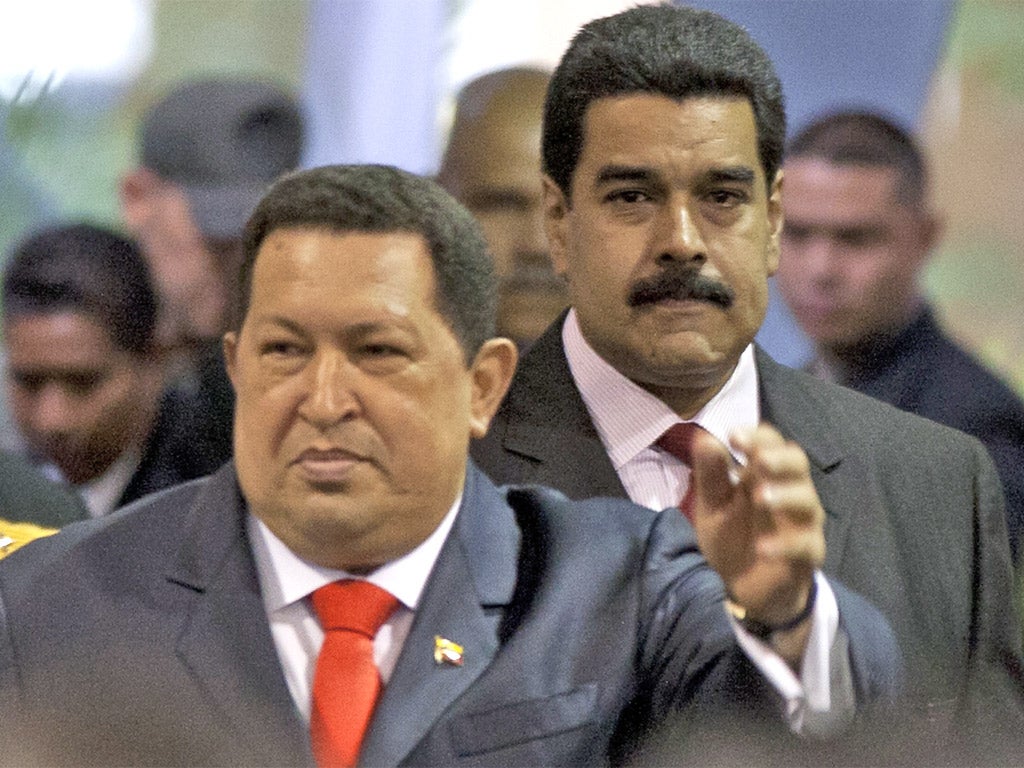Nicolás Maduro: waiting in the shadow of President Chávez

As he languished in his jail cell 20 years ago, failed coup plotter Hugo Chávez must have been grateful for every friend he could get. It was during that brief nadir that his close political and personal friendship with Nicolás Maduro, a 29-year-old bus driver-turned-union leader was forged.
Impressed by Mr Chávez's efforts to oust an elected government that had massacred hundreds of protesters against its neoliberal economic shock treatment – despite prominent campaign promises that it would implement no such policy – Mr Maduro began visiting the pugnacious army major in his cell in Yare prison, one of the most feared in Venezuela.
The pair hit it off and began plotting the political comeback that started as soon as "el Comandante" was pardoned by a new government in 1994. As Mr Chávez's political star rose, so did Mr Maduro's. The president's affable, tall, mustachioed sidekick first became a member of the 1999 constituent assembly convened by Mr Chávez, then a congressman and then, from 2006 until this month, foreign minister.
Now, appointed vice-president, and with deep uncertainty about the 58-year-old president's health after three cancer operations in the last 12 months, Mr Maduro is perfectly positioned to inherit Mr Chávez's self-appointed mantle of leader of Latin America's 21st Century "Bolivarian" revolution, named – inappropriately some historians say – after Simó* Bolívar, the hero of Spanish-speaking Latin America's 19th century independence from Spain.
"Look where Nicolás is going," the president said as he proudly announced his new number two. "Nicolás was a bus driver on the Metro [Caracas's public transport system] and look how the bourgeoisie make fun of him."
Nevertheless, there remains doubt over whether Mr Maduro, should the president sicken again, will get the chance to cling to power for long.
Despite losing the election 55 per cent to 44 per cent, Henrique Capriles, a centrist who claims to offer a pragmatic, non-ideological alternative to Chávismo, has emerged strengthened from his nine-month campaign, with many analysts viewing him as the favourite to be Mr Chávez's real long-term successor.
Mr Capriles now faces a high-profile campaign to return to the governorship of Miranda state, against Elías Jaua, the outgoing vice president who is seen as representing a harder faction of Chávismo than Mr Maduro.
Should Mr Capriles win – as he did previously against another member of Mr Chávez's inner circle, Diosdado Cabello – he will likely continue to provide the leadership for the opposition that it previously lacked. Were he to succeed Mr Chávez, Mr Maduro could then face the fight of his life.
Subscribe to Independent Premium to bookmark this article
Want to bookmark your favourite articles and stories to read or reference later? Start your Independent Premium subscription today.

Join our commenting forum
Join thought-provoking conversations, follow other Independent readers and see their replies